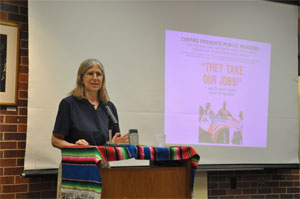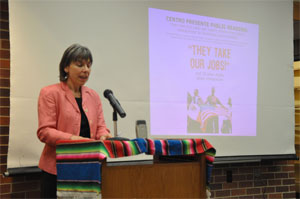
|
Dr.
Aviva Chomsky spoke at the Somerville Library about the topic from her
new book called "They Take Our Jobs – And Twenty Other Myths about
Immigration".
|
 |
 |
| State Rep. Denise Provost addressed the role of immigration in society. ~Photos by Meghan Frederico |
|
By Meghan Frederico
Historian
Aviva Chomsky came to the Somerville Library on Thursday evening to
speak about commonly held fallacies surrounding immigration policy,
which is the topic of her new book called "They Take Our Jobs – And
Twenty Other Myths about Immigration".
The book identifies and
debunks a number of economic and ideological misunderstandings about
immigration, and Dr. Chomsky, who is a professor of history at Salem
State College, focused most of her hour-long lecture on the economic
arguments due to their timeliness.
So are immigrants really a
drain on the economy? Dr. Chomsky delivered a well-supported argument
that the answer is no. She explained it this way: more consumers create
more jobs, and an influx of people to a city will create more jobs
overall, not less. And yet "some people act as if it's a zero sum
game," she said, deconstructing that viewpoint by identifying ways in
which immigration actually changes and expands existing local economies.
Dr.
Chomsky also addressed the misconception that immigrants who are
working in the U.S. illegally don't pay taxes, and drain public funds.
Everyone contributes through sales tax, she pointed out, and many
immigrants working illegally in the "formal economy" with fake social
security number pay income taxes since it is deducted from their
paychecks. Since immigrants working and residing in the U.S. illegally
are essentially paying for services that they are unable to receive,
such as social security, unemployment and other benefits that come with
being a tax-paying citizen, and Dr. Chomsky cited recent reports
calculating that undocumented immigrant workers actually pay more in
taxes than they cost the government. She also pointed out that
immigrants tend to come in prime working age, after their education has
been paid for, and usually plan on returning to their country of origin
before they retire, thereby imposing less of a tax burden than lifelong
citizens.
Dr. Chomsky also spoke compellingly about how the
creation of separate groups of people – "legal" and illegal" – creates
room for exploitation. This second-class status benefits no one, she
said, except for businesses that have less incentive to provide fair
working conditions and a greater ability to intimidate its workers.
Ingrid
Nava from Greater Boston Legal Services (GBLS), a non-profit
organization that provides free civil representation to low-income
people, pointed out that sub-standard working conditions are not legal
regardless of the legal status of the employees, and that immigrants
have legal options in such cases, although they are often unaware of
this and are reluctant to take action.
During the question and
answer period, one audience member pointed out the grammatical
incorrectness of calling a person illegal. By definition "only an
object or an action can be illegal," she said, and wondered whether
this is an attempt to dehumanize undocumented immigrants.
State
Representative Denise Provost also spoke briefly at the event,
addressing the role of immigration in society from both a personal and
historical viewpoint. Asked for her thoughts on the contributions of
immigrants to the United States, she said "I came to the conclusion
that that would be basically all the contributions in this country,"
noting that she did not mean to disparage those made by Native
Americans, but rather to point out that we are a country of immigrants.
Observing
the way in which some people brag that their ancestors came to the U.S.
"legally" unlike some of today's immigrants, Rep. Provost asked the
audience rhetorically, "you think anyone on the Mayflower had papers?"
Dr. Chomsky also addressed claims like this, identifying how this sort
of argument does not take into account the inequities in U.S.
immigration policy, which allowed unrestricted access to white
Europeans for most of our country's history.
The event was
sponsored by Centro Presente, a statewide Latin American immigrant
organization that works for immigrant rights and for social and
economic justice.
|
Reader Comments